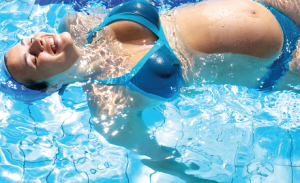Summertime means long vacations, hanging out by the poolside and camping with the kids, except if you’re pregnant. Carrying a bundle during the peak of the summer heat means feeling like a beached whale, propping your feet up 24/7 and craving to eat an entire watermelon. Let’s just say it’s not the most pleasant feeling in the world — especially if you are further along. Amanda Herron, D.O. at Mercy Health – East and Eastgate Obstetrics and Gynecology, says it’s true that you are most definitely cooling for two which is one reason the heat takes such a toll on your body.
“It’s common for moms-to-be to experience a number of uncomfortable side effects in the summer, including swelling, dehydration, heat intolerance and an increased sensitivity to the sun,” she says.
“During pregnancy, mom’s blood volume increases significantly and the blood vessels dilate which can make mom feel warmer than normal, adding to mom’s potential for discomfort in warmer weather.”
KEEPING COOL
Hydrate, hydrate, hydrate; prop your feet up every chance you get, stay cool and count the days until that sweet little baby pops out. What you’re feeling is normal, only, very uncomfortable.
“The biggest thing is that the amount of water needed is higher,” says Jenny Demos-Bertrand, D.O., OB/Gyn for The Christ Hospital. “Your body uses that water much faster in the hot weather than in the cold. So keep drinking. Your uterus is a big muscle, it can contract when you get dehydrated.”
Note that these contractions, or Braxton Hicks, you may feel due to dehydration are not labor contractions. They are, however, enough to irritate you as an expectant mother carrying a baby in the summer heat, according to Demos-Bertrand. You can also expect to sweat a lot more, which is your body’s way of staying cool, says Herron. Staying hydrated is also key to avoiding heat exhaustion and heat stroke.
Herron recommends to avoid standing for too long, and to stretch often. In addition to increasing your water intake (as well as fruits and veggies with high water content), try wearing loose clothing, walking and resting more often (lying down on your left side with your feet propped up will help reduce any swelling). Coffee, tea, juices and soda do not help, although it sounds so right just to chug a full can of Diet Pepsi, this will do you more harm than good.
“A simple tricks is getting a fan and pointing it in your direction,” suggests Demos-Bertrand. “You can put ice packs in your pillowcase to keep your head cool.”
This is also the opportune time to get first dibs on the good side of the bed. Have the hubs scooch on over so you can lay on the side where the AC vents are pointed toward you; put on your cool pajamas or sleep in the nude, says Demos-Bertrand.
YOU, HEAT & BABY
Will Baby feel it if you overheat? Luckily, Baby is very protected, and does not feel hot or cold from the inside. However, your baby’s organs begin forming before you are 12 weeks pregnant, Herron says. This makes it an important time for keeping cool, managing fevers and avoiding heat stroke, spas and hot tubs.
“Too much heat is associated with a greater risk of baby developing spina bifida,” she says. “If you become dehydrated in late pregnancy and experience contractions, that is when baby will feel the most discomfort.”
HEAT EXHAUSTION
If you feel headache, fatigue, dizziness, muscle cramps, increased thirst and more, it’s time to cool off immediately:
• Place a cool rag on your forehead
• Take a cool shower or bath — not hot!
• Hydrate immediately
• Check your urine; it should be pale yellow
• Call your doctor if symptoms do not subside in 30 minutes





